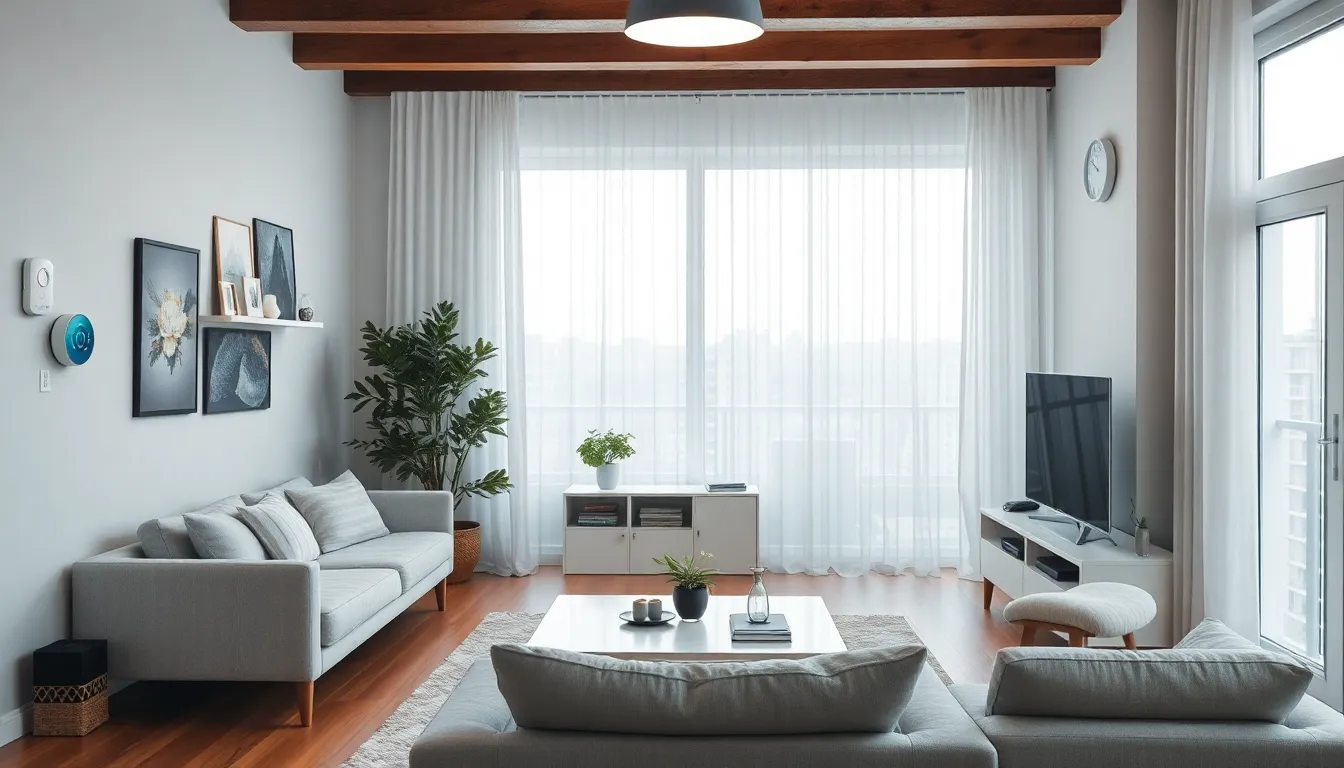Imagine a home that knows you better than your best friend. A smart home can adjust the thermostat while you’re still in your car, brew coffee just as you wake up, and even remind you to take out the trash (because let’s face it, we all need that nudge sometimes). But before you dive headfirst into this high-tech haven, it’s crucial to weigh the pros and cons.
On one hand, smart homes offer convenience and energy efficiency that can make life feel like a sci-fi movie. On the other hand, they come with potential privacy concerns and technical hiccups that might make you question your life choices. So, is the smart home revolution worth it? Let’s explore the benefits and drawbacks, and help you decide if it’s time to upgrade your humble abode or stick with the good old-fashioned light switch.
Table of Contents
ToggleOverview of Smart Homes
Smart homes utilize internet-connected devices to enhance everyday living. These homes integrate appliances, lighting, heating, and security systems, offering automation and control from anywhere. Homeowners can manage devices through smartphones or voice-activated assistants, streamlining daily tasks.
Convenience stands as one of the most significant benefits. With smart technology, users can schedule their coffee maker to start brewing at a specific time or set the thermostat to adjust based on their preferences. Energy efficiency also improves, as smart devices can optimize usage patterns, potentially lowering utility bills. Studies show that smart thermostats can reduce energy consumption by up to 10-15%.
Security features enhance safety with smart cameras and locks. Users can monitor their property remotely and receive real-time alerts about suspicious activities. Many systems also include automatic lighting to deter intruders, adding an extra layer of protection.
However, privacy concerns arise with the collection of personal data by smart devices. Users might unintentionally share sensitive information, making them vulnerable to breaches. Technical issues can also occur, ranging from device malfunctions to connectivity problems. Regular maintenance may be necessary to ensure that systems function smoothly.
Ultimately, smart homes present a blend of benefits and drawbacks. Stakeholders must carefully evaluate these factors when considering upgrades to their living spaces. Balancing convenience, efficiency, and security with privacy and technical reliability is crucial in making informed decisions.
Pros of Smart Homes

Smart homes offer numerous advantages that enhance daily living experiences. Homeowners often appreciate the blend of technology and convenience.
Enhanced Convenience
Convenience stands out as a significant benefit of smart home technology. Devices can connect and communicate, simplifying tasks. For example, schedules can automate lighting or heating, enabling users to enjoy a comfortable environment without manual efforts. Voice-activated assistants streamline operations, allowing hands-free control for busy individuals. In addition, remote access via smartphones supports managing home systems from anywhere, making everyday routines smoother. These efficiencies make life easier, fostering a hassle-free lifestyle.
Energy Efficiency
Energy efficiency emerges as another critical benefit of smart homes. Smart thermostats reduce energy consumption by 10-15% through optimized heating and cooling schedules. Appliances with energy-saving modes operate at lower intensities during peak hours, contributing to lower utility bills. Homeowners also gain insights into their energy usage patterns, thanks to detailed analytics from smart devices. By identifying energy hogs, they can adjust habits accordingly. Ultimately, smart home technology promotes sustainability while lessening environmental impact.
Increased Security
Security in smart homes significantly enhances overall safety and peace of mind. Smart cameras and locks provide real-time monitoring and alert systems, granting users control over their home security. Alerts can notify homeowners of unusual activity, allowing for quick responses. Additionally, remote monitoring permits users to check on their property when away. Integration of security features into a single app increases accessibility for users. Many homeowners find that these sophisticated systems offer a stronger sense of security, protecting their families and possessions effectively.
Cons of Smart Homes
Adopting smart home technology presents several drawbacks worth considering. Some of the most significant concerns include privacy issues, reliance on technology, and costs involved in setting up these advanced systems.
Privacy Concerns
Privacy poses a major concern for smart home users. Smart devices often collect personal data to enhance functionality, creating vulnerabilities. Hackers can exploit weak security measures, potentially accessing sensitive information. Surveillance cameras and voice assistants can unintentionally record private moments. There’s a risk of companies using personal data for marketing or selling it without consent. Users must remain vigilant about privacy settings and data sharing preferences to safeguard their information.
Dependence on Technology
Dependence on technology can complicate daily life. When devices fail due to power outages or connectivity issues, life can become inconvenient. Users may feel helpless without access to important functions like temperature control or home security. A malfunctioning device can disrupt routines, especially with critical appliances. An increased reliance on tech may also reduce basic skills, leading to digital dependency over time. Finding balance in technology use is key to ensuring independence in everyday life.
Cost Factors
Cost factors play a significant role in smart home adoption. Initial investment for smart devices can be substantial, especially for comprehensive systems. While energy savings exist, recouping expenses may take time. Installation and maintenance can incur additional costs, especially for professionals. Not all devices integrate seamlessly, leading to potential replacement expenses. Budgeting upfront can help manage the long-term financial commitment associated with a smart home.
Smart homes offer a blend of convenience efficiency and security that can significantly enhance daily living. However the potential drawbacks like privacy concerns and reliance on technology can’t be overlooked. Homeowners must carefully evaluate their priorities and comfort levels with technology before making the leap. Balancing the benefits of automation and energy savings against the risks of data exposure and technical failures is essential. Ultimately the decision to embrace smart home technology should align with individual lifestyles and values ensuring a harmonious living environment.



